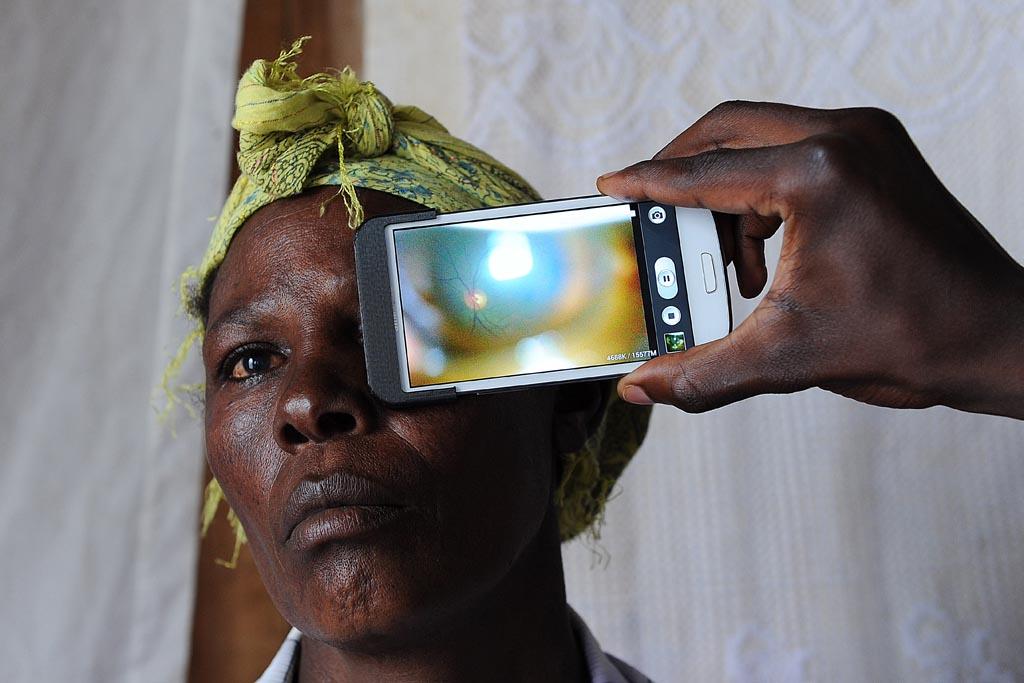Where would global healthcare be without the private sector?
A technician scans the eye of a woman with a smartphone application as she takes part in an ophthalmological study and examination near Naivasha, Kenya. The ‘Eyephone’ app can detect eye diseases and disorders, and could potentially provide low-income Kenyans with an opportunity to get a quick and effective diagnosis of their eye problems.
CAMBRIDGE, Mass. — Daktari Diagnostics recently launched its first product in Africa — a low-cost handheld device to guide treatment for people with HIV. The portable technology, which monitors patients’ CD4 cell counts by a simple blood test, stands to help HIV infected people in low-resource settings get the appropriate medical care they need.
But it was not an easy feat to get the product to market. Daktari needed to raise $35 million to develop the CD4 device, which took five years to do. A major portion of the investment came from a group of private investors, including Merck’s Global Health Innovation Fund, the pharmaceutical giant’s venture capital arm, and Norwich Ventures, a capital firm focused on investing in early stage medical technologies. The fundraising experience, said Daktari Diagnostics CEO Bill Rodriguez, was the toughest part of this project.
Rodriguez shared Daktari’s development process in a session on healthcare innovation at the fourth annual MIT: Africa Innovate Conference on Saturday. He was joined by five panelists from the healthcare industry, who discussed how technological innovations have changed the landscape of healthcare in Africa and the next big ideas required from entrepreneurs investing in the continent.
The development of new devices such as Daktari’s faces two major challenges, Rodriguez said. “[First], a lot of the technology innovation pipeline for drugs and medical devices is highly capital intensive. Second, people feel less comfortable making money out of poor people’s health.”
These two factors can be significant hurdles to attracting private investments in start-up medical technology companies and ultimately, to improving health outcomes. “It’s not always a technology problem," said Rodriguez. Sometimes it can be "a business model problem.”
But that may be changing. Other panelists were optimistic about the future of healthcare product development.
Elizabeth Bailey, director of the Consortium for Affordable Medical Technologies (CAMTech), a network that supports innovative technologies to improve health in low- and middle-income countries, said that there is a growing number of entrepreneurs who are looking to invest in healthcare innovation.
"We have been really encouraged to see enthusiasm from this network of entrepreneurs who don’t necessarily see themselves as innovators" but who can apply business frameworks to the financial challenges of healthcare innovation, Bailey said.
Indeed, according to the panelists, business skills are as much an integral part of global health innovations as technical expertise.
“We look for technologies that are not only technically innovative and clinically impactful but also commercially viable,” Bailey said.
Still, many agreed with Rodriguez that the high–risk investments associated with research and the lower returns expected from developing economies will always remain challenges to attracting investors to global health.
Janeen Uzzell, director of healthcare programs for General Electric Africa, said that though African healthcare markets can be daunting for any business model because of this high risk-low benefit ratio, healthcare innovation is becoming a more attractive investment. Companies like GE are partnering with local governments and coming in with large capital investments.
Joia Mukherjee, Chief Medical Officer at Partners in Health said that the most important thing for potential investors to remember is that what might not qualify as ‘innovative’ here in the US might be novel and extremely useful in a low-resource setting. For example, Partners in Health introduced GPS devices to map cholera and typhoid epidemics in Haiti, Malawi, Rwanda and Lesotho. It is a relatively simple technology that “helped to leapfrog the enormous gap in healthcare delivery,” she said.
Many African country governments have limited resources for investing in research and development of medical technologies. “To fill the entire vacuum that exists with the products that we need,” said Daktari’s Rodriguez, “we are going to need the private sector.”
More from GlobalPost: Global health leaders, corporations push public-private partnerships
Deeksha Dua is a Global Health student at Boston University. Having trained as a physician at Manipal University in India, her passion for global health reporting stems from treating patients in community health centers across Delhi and Karnataka. She has worked in various capacities as researcher, public health writer and team consultant for the Boston Medical Center, the Public Health Foundation of India and the Health Economics and Epidemiology Research Office in South Africa.
Every day, reporters and producers at The World are hard at work bringing you human-centered news from across the globe. But we can’t do it without you. We need your support to ensure we can continue this work for another year.
Make a gift today, and you’ll help us unlock a matching gift of $67,000!
